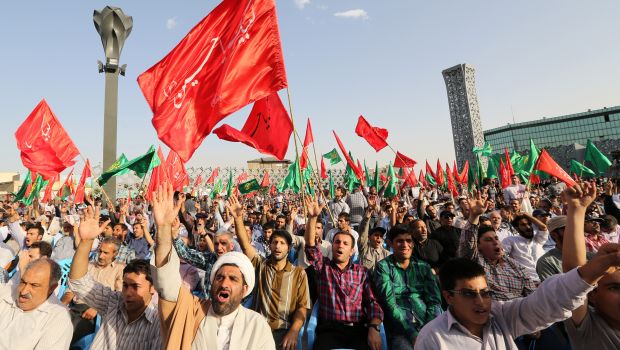
Iranians protest against the Islamic State of Iraq and Syria (ISIS) on June 24, 2014 at Imam Hossein Square in Tehran. (Atta Kenare/AFP/Getty Images)
Qassem Suleimani was only a young soldier in the Iran–Iraq War when he led Iranian troops through Iraqi minefields, stealing the odd goat along the way, and earning the respect even of the enemy.
Today, Suleimani, the head of Iran’s Quds Force, the special forces unit of the Islamic Revolutionary Guard Corps, is marching Iran through a very different minefield. As soon as the jihadist Islamic State of Iraq and Syria (ISIS) had swept through large parts of northern Iraq and captured Mosul, Iraq’s second city, news broke that Suleimani had arrived in Baghdad to “assist” the Iraqis.
Quds Force troops are now also reportedly on the ground—at least one of their fighters, named as Alireza Moshajeri, was killed fighting last month. Intelligence assistance and logistical aid are also flowing from Tehran to Baghdad.
But none of this has really helped. ISIS continued its march through Iraq and announced its success by truncating its acronym to IS, and the Islamic State of Iraq and Syria became, with triumphal brevity, the Islamic State. Enough territory was eventually captured that its leader, Abu Bakr Al-Baghdadi, declared the fulfilment of his goal—a caliphate encompassing Iraq and Syria. But this is just the beginning: the group has put out hilariously delusional maps in which its projected Caliphate extends into Europe.
It is unlikely that ISIS will hold onto its gains for long. It may have a talent for murder and larceny—it has stolen hundreds of millions of dollars from banks across Iraq—but it has an even greater one for making enemies. Those arrayed against it include the Iraqi government, Shi’ite militias, moderate Sunnis, the Kurds, the EU and, of course, the Iranians and the US. The maxim “mine enemy’s enemy” has never seemed so relevant.
Nonetheless, the situation remains grave. Baghdadi seemingly feels so secure in his position that he decided to publicly announce (in advance, no less) the time and location of a Friday sermon he gave in Mosul. If ISIS is to be stopped it needs to be defeated, and the Iraqi army won’t be able to do it alone.
What this means is that Iran is now involved in two wars: one in Syria, where it has spent the past couple of years propping up the gormless President Bashar Al-Assad, and now in Iraq. And things are escalating. Iran recently sent three Russian-made Su-25 planes to Prime Minister Nuri Al-Maliki’s government for deployment against ISIS (though Iraqi officials claim the Su-25s were originally Iraqi Air Force planes that were flown to Iran during the 1991 Gulf War for safekeeping). It is almost certain that the Iraqis will need more help.
The chance to increase Iranian influence in Iraq will not have been lost on Suleimani. So dependent is Iraq’s prime minister on Iranian support that it is likely he will cave in to pretty much any Iranian demand. He already owes his position to Tehran, which was instrumental in getting him elected and must therefore take some of the blame for the situation. But it was Maliki’s crude sectarianism—sacking Sunni ministers and overtly discriminating against the Sunni population, that has, in part, created the conditions that have allowed ISIS to enjoy such rapid success.
Has Suleimani overreached, then? A weakened Iraq benefits Iran, but does a fractured one with sectarian-based successor states? ISIS demolished the border between Syria and Iraq and declared the end of the Sykes-Picot Agreement, and with it what it described as the Middle East’s artificial borders. Iraq may now collapse. The Sunnis have had enough of Shi’a rule and the Kurds have already announced their intention to seek their longstanding goal of an independent Kurdish state. If this occurs, then Sunni Arab and Kurdish states on Iran’s frontiers pose a direct threat to Iran’s long-term security, or so the argument goes.
This is a valid but incomplete argument. First of all, there are considerable interests working against Iraq disintegrating (not least Tehran and the US), but even if it did, it is questionable just how badly it would affect Iran. Any Shi’a state to emerge would become, if not an Iranian vassal, then even more reliant on Iran than Iraq is now (there being no Sunnis around to protest).
The Kurds, meanwhile, have had a de facto state for years, which has not prevented the Iranians working with them to the advantage of both.
The Sunni state would likely be the only real problem. But if history is anything to go by, it would probably be too busy with internal squabbling to pose much of a threat. Indeed, it might further increase Iranian influence because of its potential to be a breeding ground for jihadists and the threat it would pose to the “Iraqi” Shi’a state, and possibly to Shi’ites across the Middle East, which would make Iran even more necessary to regional stability.
It would all be a mess, of course. There would be fighting and dying and destruction that would cost Iran, in terms of finances, political capital and the sheer headache of dealing with it all. But this is the Middle East: so it ever was. A pliant Shi’a state, a Kurdistan you can talk to and a far smaller, weakened Sunni state would pose far less of a threat to Iran than Iraq did under Saddam.
The greatest danger ISIS poses is in fact to Iraqi and Middle East stability. The prospect of continuing chaos is high. But while your opponents are fighting each other they cannot fight you: Mine enemy’s enemy indeed.
This article was originally published in The Majalla.
All views expressed in this blog post are those of the author and do not necessarily represent the views of, and should not be attributed to, The Majalla magazine or Asharq Al-Awsat newspaper.

Trackbacks/Pingbacks